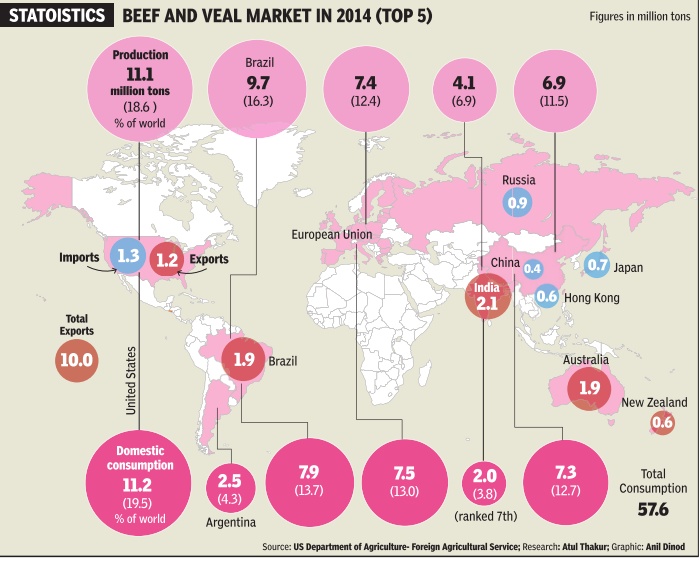Beef trade: India
(→2014) |
(→Serving beef in Delhi restaurants: the legal position) |
||
| Line 15: | Line 15: | ||
In 2014, India was the world's largest exporter of beef (including buffalo meat). A little over 2 million tons of beef was exported from India, which constituted more than 20% of the world's total export of bovine meat. India is also the fifth largest producer and the seventh largest consumer of bovine meat if one counts the EU as a single entity. The US leads the world in production, consumption and import of beef, while Brazil is second in production, consumption and exports. | In 2014, India was the world's largest exporter of beef (including buffalo meat). A little over 2 million tons of beef was exported from India, which constituted more than 20% of the world's total export of bovine meat. India is also the fifth largest producer and the seventh largest consumer of bovine meat if one counts the EU as a single entity. The US leads the world in production, consumption and import of beef, while Brazil is second in production, consumption and exports. | ||
| − | =Serving beef in Delhi restaurants: | + | =Serving beef in Delhi restaurants: The legal position= |
[http://epaperbeta.timesofindia.com/Article.aspx?eid=31808&articlexml=Law-prohibits-serving-of-beef-28102015002023 ''The Times of India''], October 28, 2015, Oct 28 2015 | [http://epaperbeta.timesofindia.com/Article.aspx?eid=31808&articlexml=Law-prohibits-serving-of-beef-28102015002023 ''The Times of India''], October 28, 2015, Oct 28 2015 | ||
| Line 22: | Line 22: | ||
'''Law prohibits serving of beef''' | '''Law prohibits serving of beef''' | ||
| | ||
| + | |||
A year after it won the first election in 1993 to the newly-created Delhi assembly , the then BJP government passed a law banning cow slaughter. | A year after it won the first election in 1993 to the newly-created Delhi assembly , the then BJP government passed a law banning cow slaughter. | ||
Since then, despite change of governments at the helm, The Delhi Agricultural Cattle Preservation Act 1994 has continued to remain on the statute books, with an occasional amendment to tweak rules.The Act is a stringent one since it makes the offences non-bailable and cognizable. | Since then, despite change of governments at the helm, The Delhi Agricultural Cattle Preservation Act 1994 has continued to remain on the statute books, with an occasional amendment to tweak rules.The Act is a stringent one since it makes the offences non-bailable and cognizable. | ||
Revision as of 07:54, 8 November 2015
This is a collection of articles archived for the excellence of their content. |
2014
The Times of India, Oct 06 2015

In 2014, India was the world's largest exporter of beef (including buffalo meat). A little over 2 million tons of beef was exported from India, which constituted more than 20% of the world's total export of bovine meat. India is also the fifth largest producer and the seventh largest consumer of bovine meat if one counts the EU as a single entity. The US leads the world in production, consumption and import of beef, while Brazil is second in production, consumption and exports.
Serving beef in Delhi restaurants: The legal position
The Times of India, October 28, 2015, Oct 28 2015
Abhinav Garg
Law prohibits serving of beef
A year after it won the first election in 1993 to the newly-created Delhi assembly , the then BJP government passed a law banning cow slaughter. Since then, despite change of governments at the helm, The Delhi Agricultural Cattle Preservation Act 1994 has continued to remain on the statute books, with an occasional amendment to tweak rules.The Act is a stringent one since it makes the offences non-bailable and cognizable.
While there have been few prosecutions and convictions, the police have focused more on booking cattle thieves or those transporting the animals illegally than going after eateries serving beef.
Ostensibly , the law aims to preserve animals “suitable for milch, draught, breeding or agricultural purposes“ and makes killing of cows, calf, bulls and bullocks a punishable offence. The law is worded in such a manner that it is nearly impossible for beef to be served legally in a restaurant or eatery unless the owner can prove the meat is that of a buffalo and not of a cow.
For instance, section 7 of the Act prohibits “sale, purchase, disposal in any other manner of agricultural cattle“ and bars any person from buying or selling or otherwise disposing of any agricultural cattle for slaughter “knowing or having reason to believe that such agricultural cattle shall be slaughtered.“
This means restaurants serving beef run the risk of criminal prosecution even if they claim it was sourced from a state where it is legal to slaughter the animal. The next section (Section 8) of the Act tightens the screws even more by making it illegal to possess “flesh of agricultural cattle.“ Even if the “flesh“ is that of an agricultural cattle (cow, calf, bull, bullock) that has been slaughtered outside Delhi, the person found carrying it will be punished. “No person shall have in his possession flesh of any agricultural cattle slaughtered outside Delhi,“ it says.
According to the Act, only a veterinary officer or a police officer have the power of “entry , search and seizure“ to apprehend the accused or prevent cow slaughter in their jurisdiction. A police officer can enter, stop and search “any vehicle used or intended to be used for the export of agricultural cattle“ and seize the animal itself if he suspects it is headed for slaughter.
Persons indulging in transportation and sale of banned animals invite a jail term of up to five years and a fine of Rs 10,000 while those found in possession of cow beef may be jailed for a year.